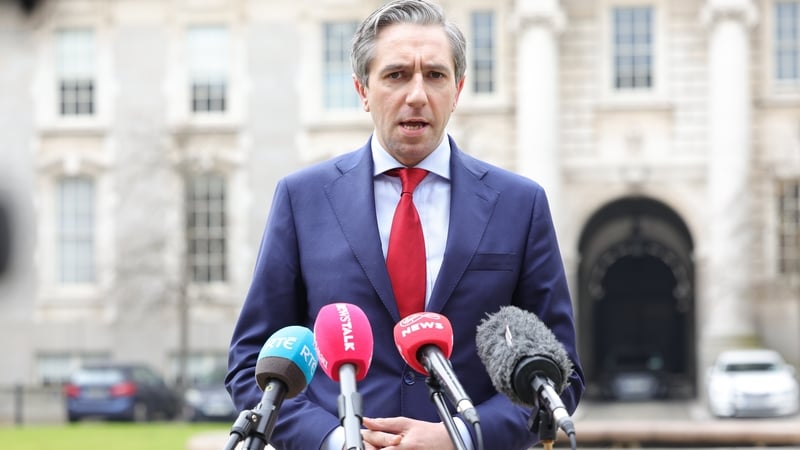Tánaiste Simon Harris will travel to the United States next week for a meeting with the US Secretary of Commerce Howard Lutnick.
It is understood the meeting will take place on Wednesday.
The two men have already spoken on the telephone in recent days when they discussed the two-way nature of the trading relationship between the countries.
The meeting comes as Irish exporters to the US are still coming to terms with 20% tariffs imposed by US President Donald Trump and as the threat of further tariffs on pharmaceutical exports remains.
The Chief Executive of employers group Ibec has said the effect of the tariffs announced earlier this week will be felt immediately by some companies which will have consequences for workers in Ireland.
Speaking to the media after attending the Government’s Trade Forum, Danny McCoy said short-term working is a possibility for some staff.
“Demand will fall away very quickly for some products and so there just won’t be the work there,” he said.
Mr McCoy said Ibec wants a support scheme to be put in place for such workers.
“We are talking to Government about having a support scheme immdiately for workers.
“We really want people to remain connected to their employers because this will pass. Even if tariffs stay in place for a while, new markets will be found and new opportunities.”
He said “There are some sectors very exposed, particularly in the consumer space.
“So the drinks industry will be impacted quite immediately and that will have consequences for their employees.”
We need your consent to load this rte-player contentWe use rte-player to manage extra content that can set cookies on your device and collect data about your activity. Please review their details and accept them to load the content.Manage Preferences
US antipathy towards EU is misplaced, says Taoiseach
The Taoiseach has said there is antipathy to the European Union within the US administration that is misplaced.
Speaking on his way into a meeting of the quarterly Labour Employer Economic Forum, Micheál Martin said the response to US tariffs must be done in a way that does not invite more damage.
“There is an issue there, without doubt. Within the US administration there is an antipathy that’s not disguised towards the European Union. Misplaced, in my view, because if you take the European Union as a bloc, the trading relationship between it and the US is the biggest in the world. It has helped raise prosperity.
“Many of the big US pharma and technology companies have done well out of the European market. I mean, that seems to be forgotten by the US administration, and has done very well.”
Mr Martin said President Donald Trump’s criticism of a trade imbalance between the US and the EU only focused on the movement of goods and “ignored” the services industry.
“President Trump and the administration have very carefully just put services to one side,” he added.
“But services is the growth engine of modern economies, and the US enjoys a much, much better relationship on the services side with Europe, and indeed with Ireland, than it does on the goods side. But that gets ignored.”
He said the EU has a difficult task to balance the interests of member states in framing any response, adding that the bloc will engage with the US to “negotiate a sensible landing zone”.
Mr Martin said the era of free trade that Ireland and other countries have enjoyed for decades is coming to an end, and that “protectionism is coming back and we know from history protectionism does not work”.
We need your consent to load this rte-player contentWe use rte-player to manage extra content that can set cookies on your device and collect data about your activity. Please review their details and accept them to load the content.Manage Preferences
Read more:
Trump tariffs provoke world condemnation
Not yet clear what next few weeks will bring for Ireland’s pharma sector
There is nothing ‘reciprocal’ about Donald Trump’s tariffs
Targeting of EU by erstwhile closest ally follows litany of insults and threats
Regarding pivoting Ireland’s economic model away from large foreign direct investment companies in favour of developing indigenous ones here, he said: “It’s not either or. The old order is changing, it may change again. We have to work better, parallel with that, on how we scale up Irish companies.”
The Taoiseach also said “it’s far too early to be specific” on whether commitments made in the Programme for Government will be delayed because of the current trade uncertainty.

On Wednesday, US President Donald Trump announced a 20% tariff on imports from the European Union, saying the figure is about half the EU levy on US goods.
He also said he would impose a 10% baseline tariff on all imports to the United States.
While the European Union wants to engage in negotiations, Mr Martin said, counter-measures are also an option, however a willingness to negotiate on the US side “remains to be seen.”
Speaking on RTÉ’s Morning Ireland, the Taoiseach said: “What is not sustainable is the current situation. Economically it will hurt American consumers, it will hurt American businesses, it will hurt the world economy.
“The pain won’t be short-term because this is a significant inflationary hit by any yardstick, and in my view, is not tenable or sustainable.”
He added: “The European Union wants to engage in negotiation, the President of the Commission [Ursula von der Leyen] has said that to me last week, but the European Union is designing countermeasures if negotiations don’t succeed or are not concluded in a satisfactory manner.”
Mr Martin said that the “other option” would be countermeasures and a response “that would be very damaging for all concerned.”
There is a worrying antipathy towards the EU by the US, the Taoiseach added.
“We are in a very, very unchartered situation, it’s uncertain and that’s bad for the world economy,” he said.
“My biggest concern right now is sentiment is going to go down, investment decisions are being paused, Ireland is a small open economy, we want growth in the world economy – that will impact us quite significantly as well, not just the tariffs.”
He said that there is a lot of work going on between the pharmaceutical industry and the US administration.
“In terms of the supply chain, in terms of costs of medicines to US citizens, it’s not simple,” he said.
Mr Martin said that a big issue which the US will face in their move to re-shore companies will be an employee shortage to fill roles.
“There’s a huge shortage in the US in terms of human capital and people to actually do the job, so the idea of re-shoring pharmaceutical immediately doesn’t seem practical or feasible, and the same with semiconductors.”
He said that many of the multinational companies he has engaged with are saying that they are “very happy” with Ireland, and here for the long haul.
We need your consent to load this rte-player contentWe use rte-player to manage extra content that can set cookies on your device and collect data about your activity. Please review their details and accept them to load the content.Manage Preferences




